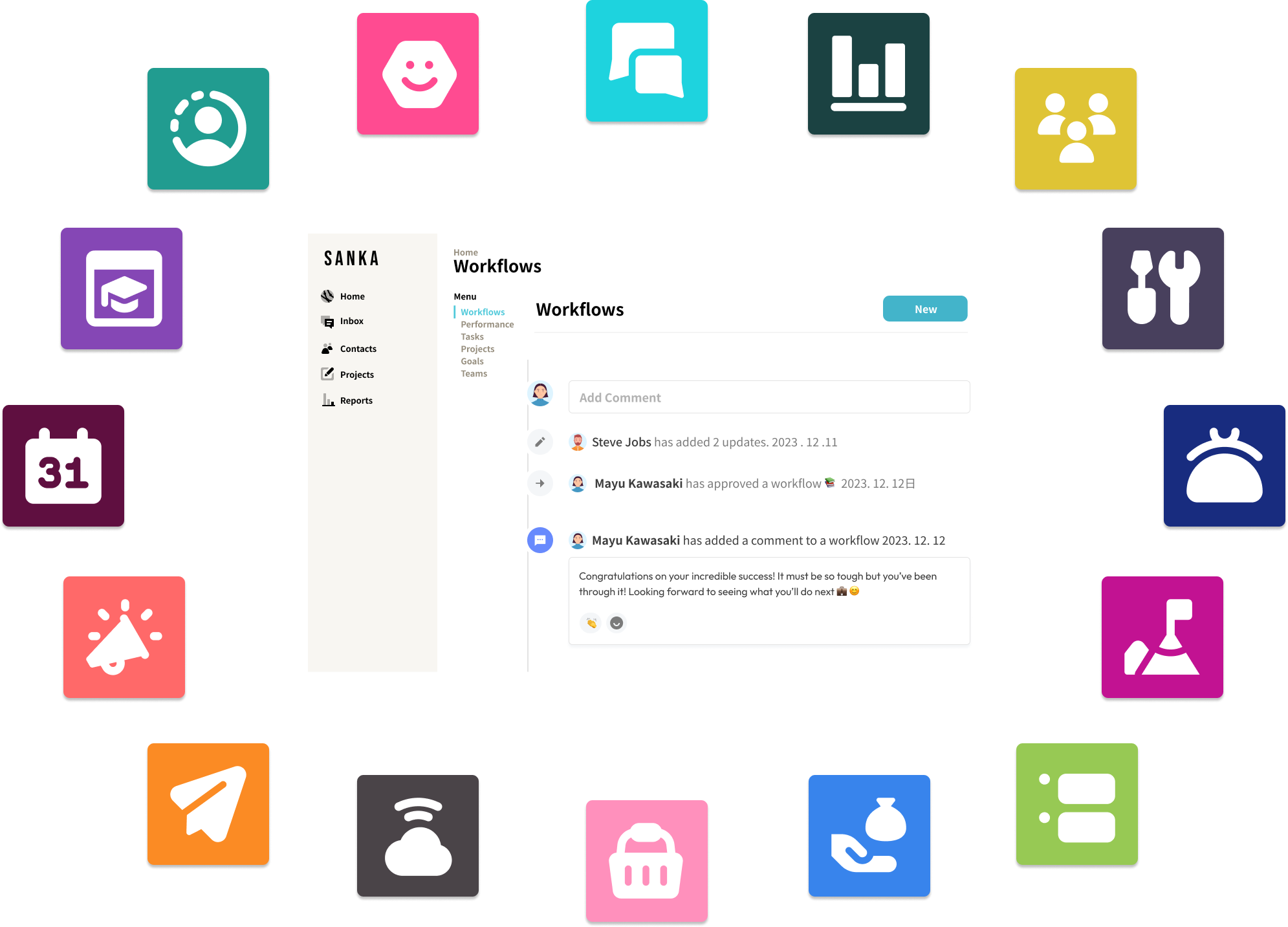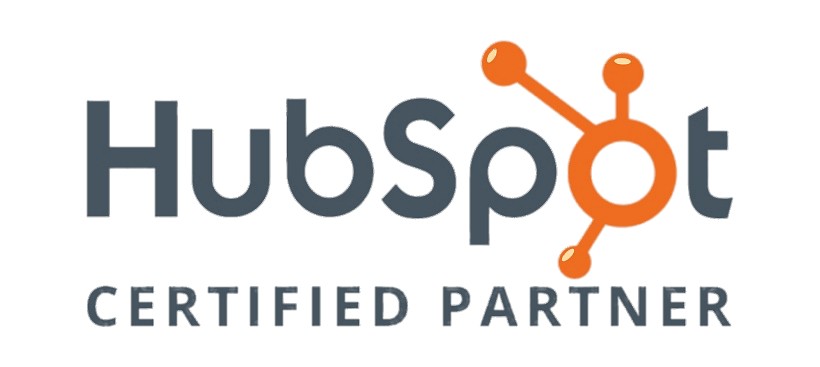Introduction
In the past couple of decades, the advent and rapid growth of digital technologies has made a significant impact on various industries, none more so than the travel sector.
The digital journey in the travel industry is a story of remarkable transformation, marked by profound impacts on businesses and travelers alike.
This era has witnessed the transition from traditional brick-and-mortar agencies to the dominance of online platforms and evolved travel experiences.
But what does this digital journey entail, how has it transformed the travel industry, and what are the implications for the future?
This blog post aims to delve into the digital transformation in the travel industry, discussing its significance, the role of technology, and the latest digital trends shaping the sector.
What is Digital Transformation in the Travel Industry?
Digital transformation in the travel industry refers to the integration and utilization of digital technologies to revolutionize processes, enhance customer experiences, and improve the performance of businesses within the sector.
It marks a shift from traditional methods to new ways of functioning that optimize various aspects of travel—from planning and booking, exploring destinations, to post-trip experiences.
Digital transformation involves leveraging technologies like Artificial Intelligence (AI), Machine Learning (ML), Big Data, Internet of Things (IoT), Virtual Reality (VR), and Augmented Reality (AR) to make travel more convenient, personalized, and engaging for the consumer.
Why is Transformation Significant in the Travel Industry?
The relentless pace at which digital technology advances and reshapes various industries has been the talk of the town.
The travel industry, in particular, has witnessed a massive metamorphosis through technological innovations.
But why should such a transformation make headlines, and what makes it so significant for the world of travel?
1. Enhanced Customer Experience
For any business, keeping the customer at the heart of its operations is paramount.
Digital transformation allows travel firms to offer enhanced customer experiences, cultivating long-standing relationships with their clients.
Gone are the days of generic travel offers and services; customers now seek personalized, tailor-made solutions that align with their preferences.
With the help of technology, businesses can collect and analyze customer data, which in turn, enables them to craft strategies that align with their target audience's expectations.
This data-driven approach assists in style diversification and services, making it easier for organizations to anticipate customer needs and respond accordingly.
2. Operational Efficiency
Digital transformation accelerates operational efficiency by automating and streamlining various processes.
For instance, manual tasks like data entry, route planning, or inventory management are now digitized, saving valuable time and resources.
An efficient workflow reduces human errors, increases productivity, and frees up staff to focus on other critical aspects of the business, such as customer service and strategic planning.
Faster procedures coupled with reduced error margins translates to improved overall performance - a vital competitive asset.
3. Informed Decision-Making
In the digital age, access to data and analytics has become an essential driving force for successful businesses.
The travel industry, with its global reach and diverse customer base, generates a plethora of customer data.
With digital transformation, businesses can leverage this data goldmine and access the treasure trove of valuable insights it offers.
Having access to Big Data, Machine Learning, and Artificial Intelligence enables organizations to tap into clients' preferences, spending habits, and emerging trends.
Such insights ensure data-driven decision-making, substantiating the company's objectives, and reinforcing long-term success.
4. Competitive Advantage
In an era where firms are vying for the lion's share of the market, digital transformation ensures a competitive advantage.
Companies that adopt digital practices can reach out to a broader customer base, retain their existing clients, and offer innovative solutions to traditional challenges.
By incorporating cutting-edge technology like AI, IoT, or AR/VR, companies can stay ahead of the curve, offering services in line with the latest trends and consumer expectations.
Digital transformation, thus, provides a differentiated edge, ensuring a company's success in an otherwise saturated market.
How Technology has Transformed the Travel Industry
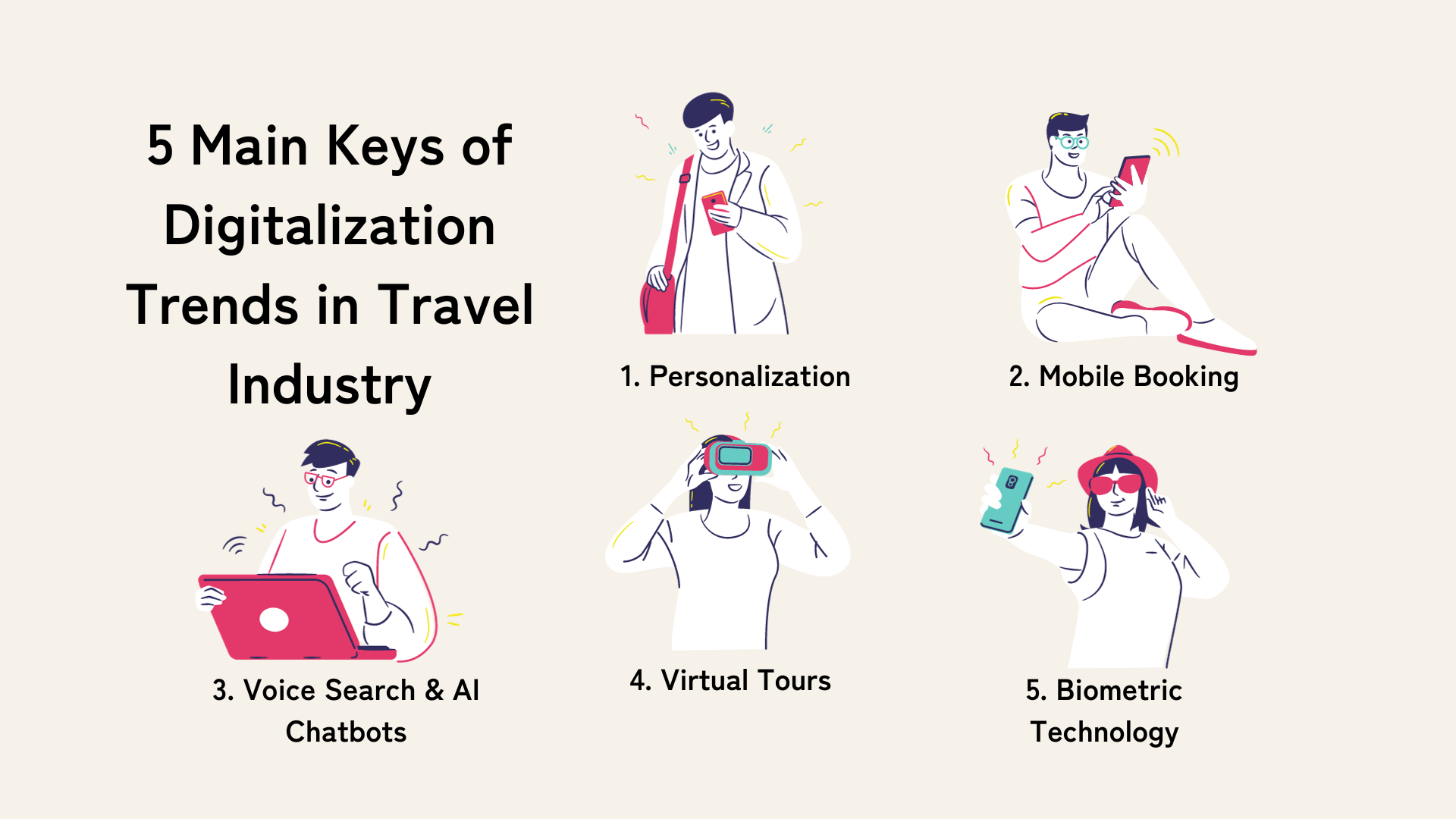
Technology has permeated almost every aspect of modern life, and the travel industry is no exception. In fact, the travel sector, with its global functioning, diverse clientele, and intricate operations, seems tailored for technological advances.
From dreaming about a vacation to after-trip services, technology has instilled a transformative shift in the way people travel.
Let's unravel the comprehensive ways technology has revolutionized the travel industry.
#1 A Seamless Planning & Booking Experience
The rise of Online Travel Agencies (OTAs) like Booking.com, Expedia, and Airbnb has revolutionized trip-planning.
Now, travelers can research destinations, compare prices, book flights, and secure accommodations from anywhere in the world, at any time, using these platforms.
Gone are the days when travelers had to rely on travel agents to handle bookings. Internet connectivity has brought the entire travel agent desk to the travelers' fingertips.
#2 The Age of Smart Travel
In a world driven by smartphones, the travel industry has found its best ally.
Mobile applications have dramatically changed the way people travel.
Apps offer real-time updates, digital boarding passes, last-minute travel deal alerts, and even act as personal tour guides.
Also, check-ins, seat selection, special requests, and services are more streamlined, thanks to mobile applications like Airbnb and Kayak.
The troves of data collected by these apps enable companies to understand customer preferences better, offering personalized travel experiences that enhance customer retention.
#3 Virtual Assistance – Your 24/7 Helper
AI-powered virtual assistants and chatbots have carved their niche in the travel industry by serving clients across different time zones, at any hour.
They offer real-time assistance to customers looking for trip recommendations, solving travel qualms, or seeking help in booking processes.
These digital assistants provide a sterling customer experience, are cost-effective and are less prone to errors, enhancing the overall efficiency of the operation.
#4 Predicting the Future with Big Data & AI
Big data and Artificial Intelligence (AI) are helping the travel industry glean insights into customer behavior, likes, dislikes, spending habits, and travel patterns.
They predict future travel trends and help businesses make more informed strategic decisions.
By analyzing large data sets, airlines can optimize their routes, improve fuel efficiency, and implement dynamic pricing.
Hotels also use this data to personalize guests' experiences, keep track of stock control, and manage their pricing models to improve their revenue management systems.
#5 Immersive Technology – A Whole New World
Virtual Reality (VR) and Augmented Reality (AR) are perhaps the most exciting tech advancements in the travel industry.
Customers can virtually visit a destination, hotel, or attraction before making a booking, thereby enhancing their decision-making process.
AR provides real-time, overlay information when users view an environment, thus adding digital elements to a live view.
For instance, Google's Live View option merges Google Street View's real-world images with machine learning to offer turn-by-turn walking directions.
#6 At Your Service – The Rise of Self-service Technology
Facilitating efficiency, pace and control, self-service check-ins at airports or hotels, digital payments and ticketing, self-ordering from digital menus are all tech advancements indicating the rise of a new kind of travel consumer - the independent, digital traveler.
#7 The Internet of Things (IoT) – Making Travels Smarter
IoT is making travel safer, more efficient, and enjoyable. Smart luggage trackers, digital hotel room keys, tailor-made travel experience through personalized recommendations based on IoT devices data are just a few examples.
The future of a completely connected journey isn't far due to seamless data sharing between companies, travel providers, and devices.
5 IoT Applications in the Travel Industry
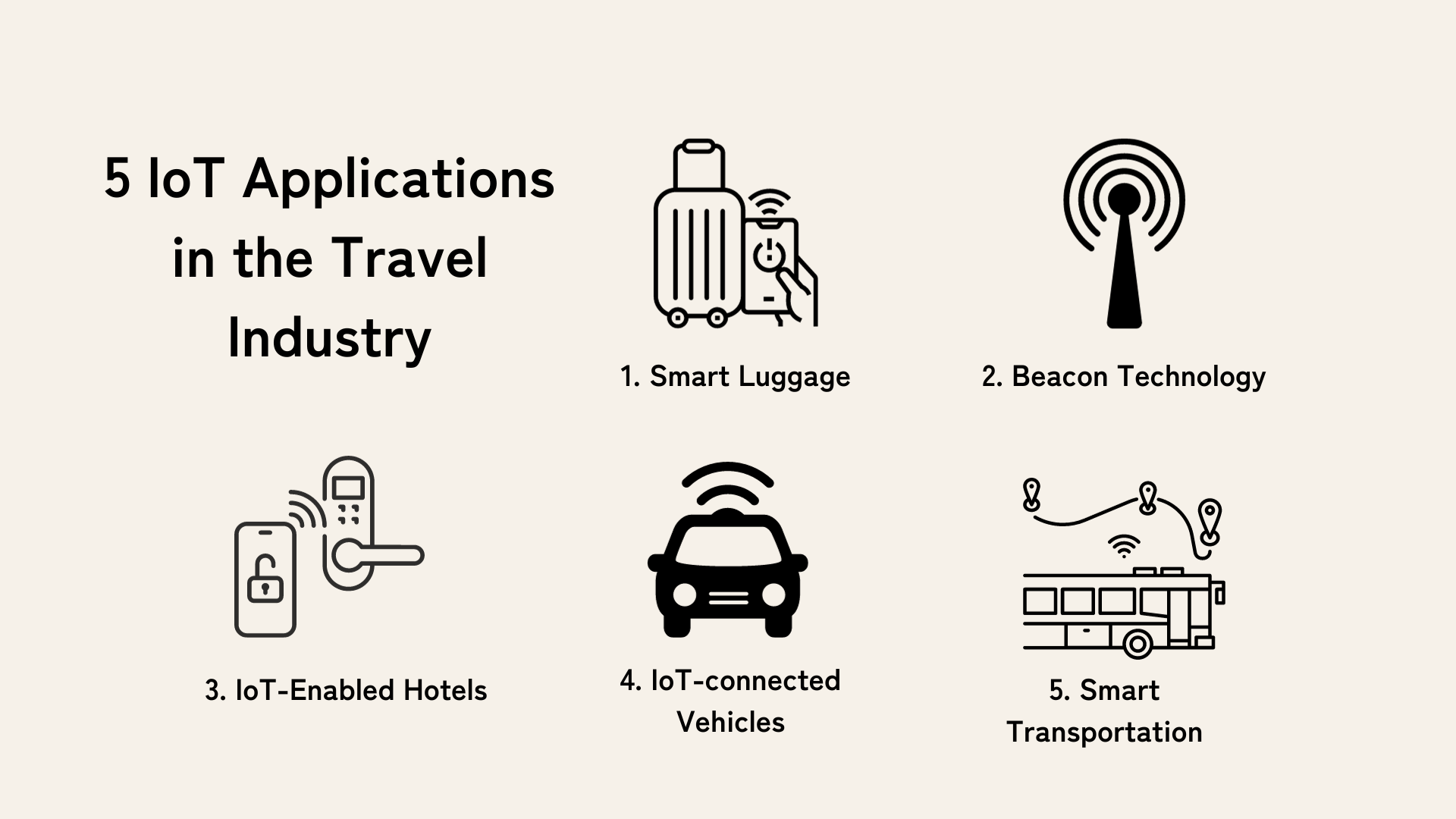
The Internet of Things (IoT) has seen rapid adoption across industries, revolutionizing both business processes and consumer experiences.
With billions of interrelated devices at its disposal, IoT is transcending industry boundaries.
One such sector to embrace IoT's potential is the travel industry, with an increasing number of IoT applications ushering in new possibilities for enhancing travel experiences.
Let’s deep-dive into five innovative IoT applications in the travel industry while providing a comprehensive understanding of their impact.
1. Smart Luggage
Travelers know how frustrating it can be to deal with lost luggage. Technology, however, offers an intelligent solution with smart luggage—a remote-sensor enabled suitcase capable of communicating with IoT devices.
Smart Luggage Features:
- GPS tracking keeps users informed about the exact location of their bags.
- Built-in digital scales allow travelers to verify their luggage's weight right on the spot.
- Lock-unlock mechanisms that rely on proximity sensors ensure the safety of their belongings.
2. Beacon Technology
Airports are deploying Beacon technology, a small wireless device that uses Bluetooth Low Energy (BLE) to communicate with IoT-enabled devices nearby.
A report by Mordor Intelligence states that the global beacon market is expected to witness a CAGR of 54.05% during 2023-2028.
San Francisco International Airport (SFO) deployed Beacon technology to help visually impaired travelers navigate the airport using the app Indoor Explorer.
Beacon Technology Features:
- Push notifications about flight status, delays, or gate changes.
- Real-time locating system (RTLS) tracks people and assets within an airport facility.
- Navigational assistance, such as directions to gates or amenities.
3. IoT-Enabled Hotels
IoT-connected hotels serve as the epitome of luxury and convenience. These establishments leverage IoT devices to personalize guest experiences, improve energy management, and streamline operations.
Hilton Hotels introduced their "Connected Room" concept, allowing guests to personalize their stays through the Hilton Honors app using IoT devices.
IoT-Enabled Hotels Features:
- Temperature, lighting, and entertainment customizations based on guest preference.
- Digital keys for seamless check-ins and increased security.
- IoT-based maintenance systems and staff tracking.
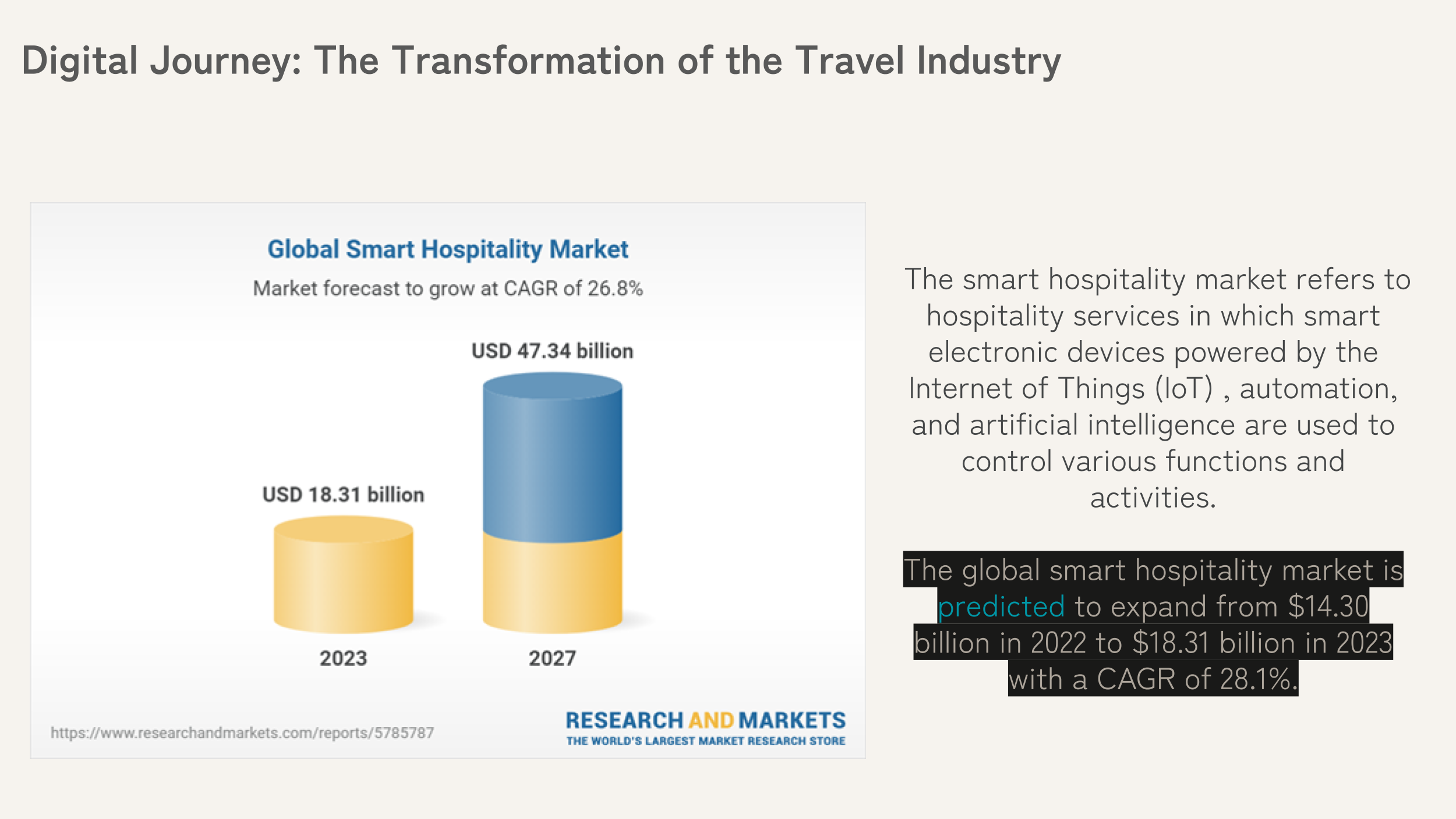
4. IoT-connected Vehicles
The evolution of vehicle connectivity features IoT technology at its heart. IoT-enabled vehicles offer improved navigation, predictive maintenance alerts, and enhanced in-car experiences.
IoT-connected Vehicles Features:
- Sensors capture real-time data on traffic patterns and adjust routes accordingly.
- Vehicle health monitoring and maintenance alerts.
- Improved fleet management and fuel optimization.
5. Smart Transportation
IoT-connected public transportation systems not only provide timely updates to travelers but also help in optimizing time, energy, and resource management in transport networks.
For example, Copenhagen's City Data Exchange uses real-time data from IoT sensors to provide recommendations on bicycle routes, parking spaces, and optimal public transport timings.
Smart Transportation Features:
- IoT devices collect real-time data to offer optimal routes to travelers, streamlining their journeys.
- Provides traffic prediction and vehicle health monitoring for improved fleet management.
- Enhanced vehicle infotainment systems for user satisfaction.
Are you ready to propel your travel business to the forefront of the digital era?
Sanka, a trusted DX partner, has your digital transformation needs covered.
With an impressive track record of aiding startups, SMBs, and global enterprises, Sanka specializes in bringing efficiency and innovation to your business processes.
Embrace cutting-edge digital transformation solutions and stay ahead of industry trends with Sanka.
See what before-and-after looks like with us where paperwork is replaced with automation, inefficiency with productivity, and service quality with unmatched excellence.
Don't wait, start your digital transformation journey today with Sanka - the trusted partner for your travel industry needs. Transform with Sanka now!
Conclusion
In conclusion, digital transformation is revolutionizing the travel industry. It is introducing efficiencies, enhancing customer experiences, aiding decision-making, and offering a competitive advantage.
As digitalization gains momentum, more businesses in the travel industry are leveraging technology to adapt to changes and meet the growing expectations of their digitally savvy customers.
The transformation also comes with its set of challenges, including data privacy risks and the need for companies to constantly update technology and adapt to evolving trends.
However, with its numerous advantages, digital transformation is undoubtedly critical for the growth and future of the travel industry.
As the sector continues to adapt and embrace new technologies, travelers can look forward to even more enhanced experiences and efficient journeys in the digital age.

